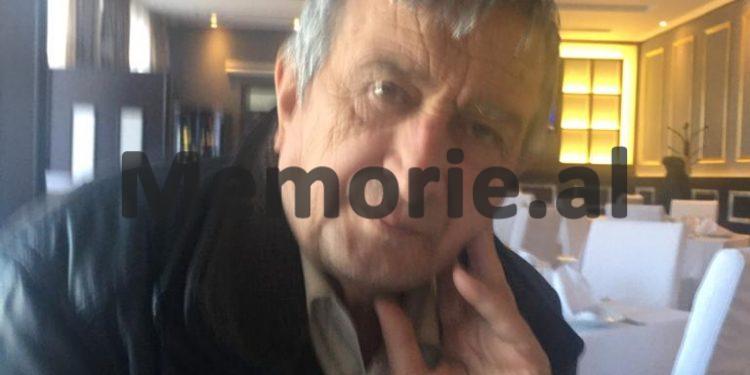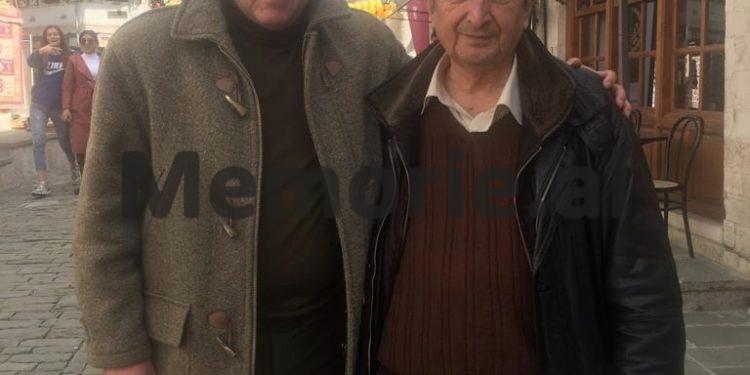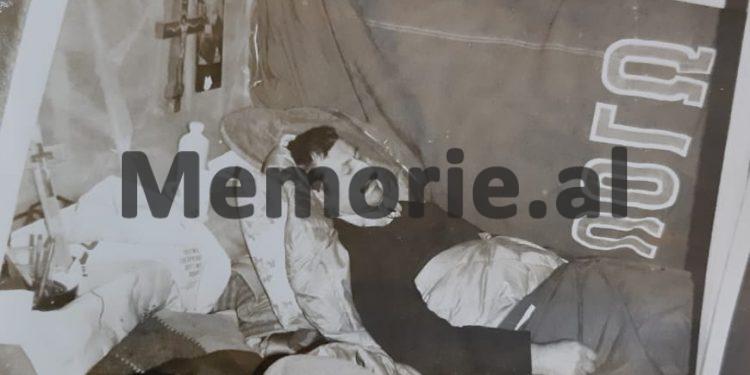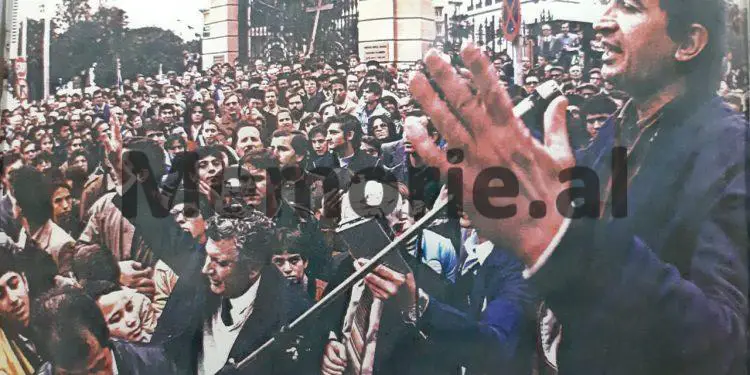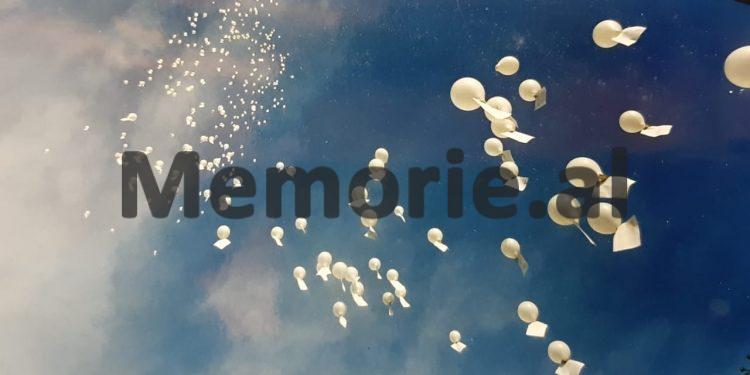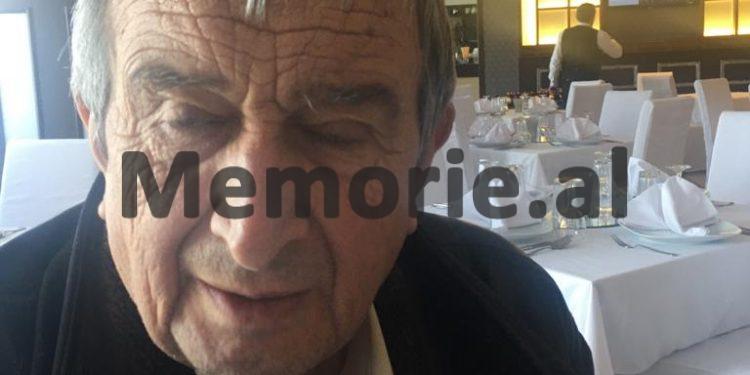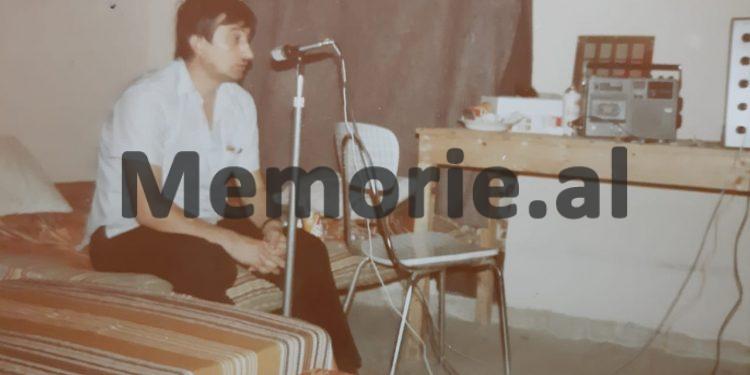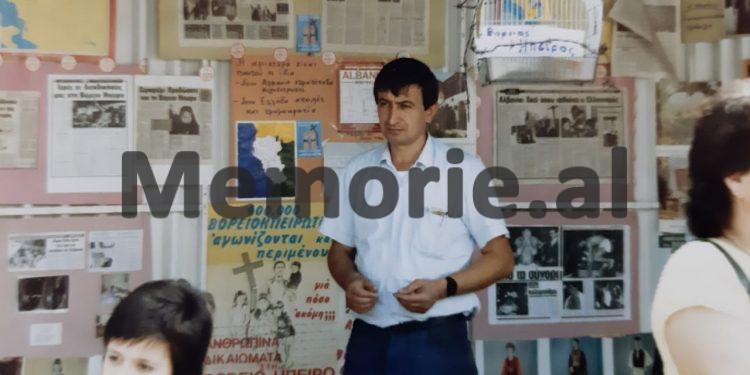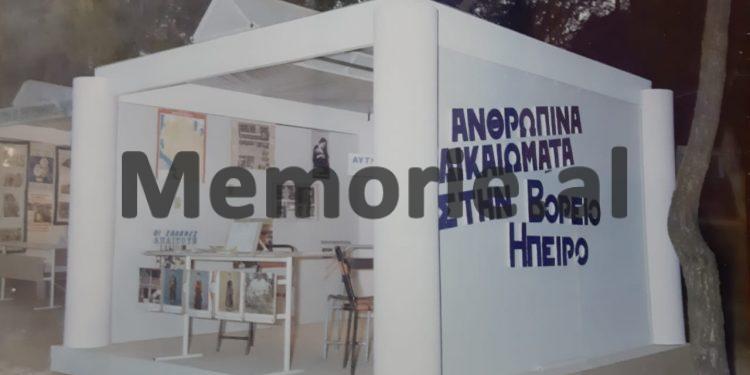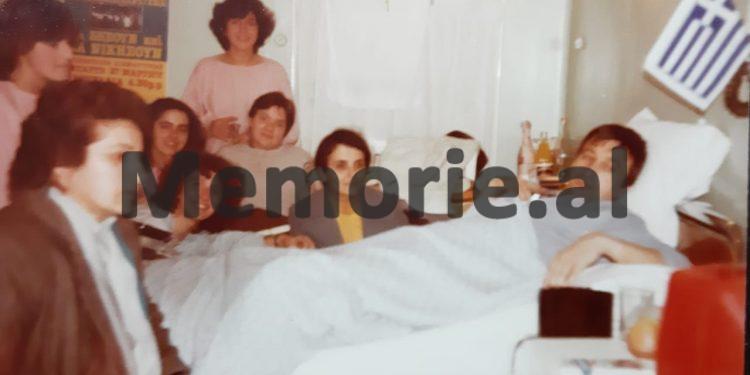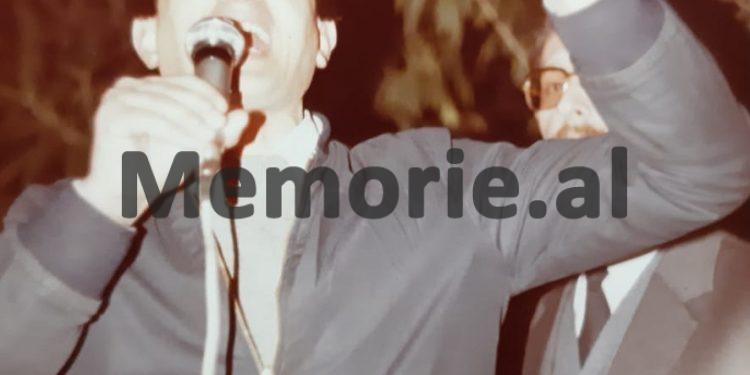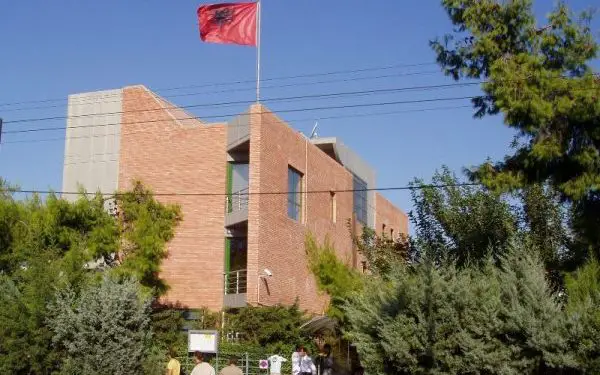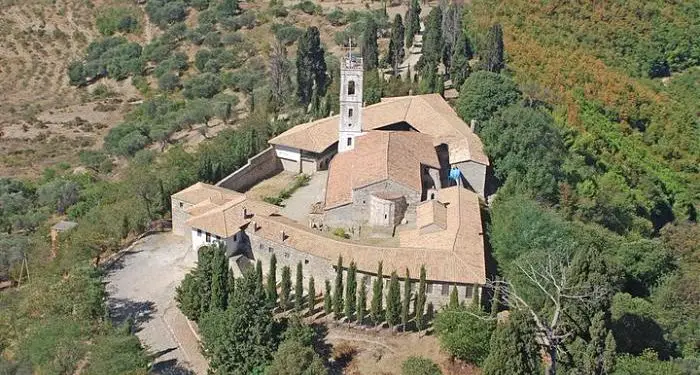Dashnor Kaloçi
Memorie.al publishes some archival documents extracted from the Archive of the Ministry of Foreign Affairs in Tirana and the Information Authority of the Files of the former State Security, which are part of a voluminous file which deals with the rare and unknown history of Ilia Lekë, originally from the village of Glinë in the Greek minority of Gjirokastra, whose family had been living in exile in Myzeqe villages since 1945, and his father, Theodhoriu, had been arrested since 1951 and were serving time in camps and prisons. accused of being a “Greek intelligence agent”.
Attempts by the State Security to recruit Ilian and then arrest him, and Ilias’ escape together with his brother Kriston and their uncle in Greece, where after some threatening letters that Ilia made to Enver Hoxha, Ramiz Alia, and Adil Çarçan, who was asked to get his father out of prison and his wife and son, to allow him to come to Greece, the three of them went on a hunger strike in front of the Albanian embassy in Athens, which lasted until 1984.
The strike sparked major diplomatic tensions between the two countries, as it sensitized not only the Greek parliament and government in Athens but also the Greek press and some ultra-nationalist parties and Vorio-Epiriot chauvinist circles led by Metropolitan Sevastianos, who exploited it. for their interests, as well as Ilia Leka’s speeches in the European Parliament and the American Congress, for the violation of human rights in the communist regime in Albania, until they forced Enver Hoxha to come out and publicly declare: “I say responsibly to the people Greek brother that in the Albanian prisons there are only 46 citizens from the Greek minority and only 4 of them for political crimes ”, as well as Ramiz Alia to release Theodhori Leka from prison in 1989, allowing him to go to Greece forever.
After the publication in four consecutive issues of a series of archival documents issued by the Archive of the Ministry of Foreign Affairs in Tirana, which has long been with the initials “Too Secret” and already declassified, where it is a correspondence of the Albanian Embassy in Athens with the Ministry of Foreign Affairs in Tirana in 1982-’84, regarding the Albanian citizen, Ilia Theodhor Leka, originally from the village of Glina in Gjirokastra and living in the villages of Myzeqe, where they have been interned since 1951, as well as Ilias’ escape to Greece in 1982 (along with his brother and uncle), after they had previously arrested their father, where they went on a hunger strike in front of the Albanian embassy in Athens for nearly three years, raising public awareness. locals, political parties, parliament, the Greek government, various organizations, etc., we conducted an exclusive interview with Ilia L himself ekën, where he sheds light not only on those documents that have already been made public by Memorie.al, but also on his entire history and that of his family, from 1945 to the present.
Mr. Ilia, can you tell us briefly how and why your family’s problems with the communist regime of Enver Hoxha started for the first time?
My father’s family lived in the village of Glina in Gjirokastra, where our origin is, which is the area of the Greek minority. During the war, his father, Theodhori or Dhosi, as we called him, volunteered with the partisans and he was wounded on August 2, 1943. It was not clear who shot him, that there was a war, but he was helping the partisans. when they wounded him and the whole village knew that. In 1944, his younger brother, Jorgo, who was only 13 years old, left for Greece. Back then there was a war and it was not clear who was coming in and who was coming out of the border that we were very close to, so his escape did not cause any problems to the father’s family. The problems started immediately after the end of the war in 1945, when the other brother of the fathers, Anastasi or Tasho Leka, left as they called him, so fleeing to Greece, always from our village that the border was very close and there were no obstacles…
Under what circumstances did your father’s brother escape?
The brother of the fugitive, Tasho, who escaped during the war, was only 15 years old and was a youth secretary for the Communists. After the War, somewhere in the village, he found an old rifle that they had thrown away because he didn’t do it and lunate with it. But who spied on one of the Party members and then summoned him to Jorgucat for questioning, not where he found it, not where he did not find it, who gave it to him, and so on. At first, when they found his old rifle, they did not tell him anything, but when a police officer from Gjirokastra came there, his name was Jonuz Abdullai, he asked his father’s brother what his name was, and when he told him; Tasho Leka, then they took him and beat him a lot, tortured him so much that blood flowed from his mouth.
But why was he tortured?
He was tortured to death when he learned that it was George’s brother who had fled to Greece before the end of the war.
What happened to Tashon afterward, how could he escape?
After being brutally beaten in Jorgucat, Tashon was released because he had done nothing and that the rifle he had found did not work, it was thrown, but out of fear, he decided to get it, as he thought they would take it back to where it was. they had beaten him. At that time in our district of Gjirokastra, out of poverty instead of shoes, we had slippers, that is, socks with slings down, and Tasho, went to a father’s cousin to sew them, but she did not sew them… And he fled barefoot to Greece, with those torn slippers where his toes and toes were mostly out. And it didn’t take long for him to escape in 1945, because in 1951 they decided to deport us.
Before we went to the internment of your family, we wanted to ask you about some documents that have been issued by the Authority for Information of Files of the former State Security, where various statements say that: Theodhori Leka was suspected as an agent of Greek intelligence and that since 1945, he has entered and exited Greece several times, had connections with his two fugitive brothers, Jorgon and Anastasi, or helped other people escape from Albania to Greece, which led to his arrest a few years later when you were interned in Kolonjë, Lushnja. What is the truth about these allegations in those files that you have made available to us?
First of all, I would like to tell you that State Security has written there how it wanted and what happened to them. With my two fugitive brothers, Jorgon and Tashon, my father’s family has only had contact with letters, once every two years, or every three years, we have given and received letters with them.
Did your father come to Greece at that time?
Of course, since his father did not speak Albanian, in 1947-’48, he went to Greek villages across the border to buy something. And not only my father, but everyone from that area fled because until then there was no border clone on the mountain and they came in and out freely. They went there secretly because in 1955 the clone was first introduced. Yes, and to help, one must have helped to get to Greece, because there were a lot of people fleeing after the arrest awaited them, and he helped them to get out. Not only my father, but there were plenty of people from the village who helped those who wanted to escape to get to Greece, so as not to fall into the hands of the State Security that was following them.
That is why you were interned in the villages of Lushnja, so why did your father go to Greece?
No, that was not the main reason, because as I told you at the time, everyone was secretly fleeing because there was no clone, and going out to Greece near our village was no problem. But we were interned, as those in the State Security said that my father’s two brothers, Jorgo and Tashon, would secretly come to the village to take us all and take us to Greece where they lived. And the village signed that: ‘both father’s fathers will come from Greece, and they will take us.’ After that, the decision was made to deport us, fearing that my father’s two brothers would come to pick us up and take us to Greece, which was a deliberate fabrication by the State Security. as they usually did to justify their work, or to anticipate something they thought might happen.
How do you remember the internment of your family from Glina in the villages of Lushnja, you were small and normally you don’t remember it, but how did your parents tell you?
In April 1951, a few years after the escape of my father’s brothers, our family took us in a wheelchair and took us to Savar, because the decision to deport us had been made.
How many people did the Leka family belong to at the time you were interned in Savër?
It was me, my father, my mother, my little brother, my father’s brother and my aunt. They took me small in the cradle.
What did they let you take with you from the house you had in Glina?
Nothing, with body clothes and anything, we put in the bags or strays we had then, so what could we hold in our parents’ arms, that we were small.
What about the cattle or anything else you had there in the village?
A friend of ours, Muço Kalo, came on foot from Gjirokastra and brought the cattle to us there because, without them, we would have died of starvation.
How did they get to where you went to find the locals?
The Myzeqars welcomed us well that they were very good and very gentle people, but the State Security did very badly especially since 1967 with the class war.
Before we get to the state treatment, how long did you stay in Savar where you first settled?
Then from Savra we were taken to Rrapëz. There was a ground floor hut with mats and reeds. There I went to school in Halilaj. Then from there, they took us to Gjoras, to the annex of Sali bey. Those of the People’s Council, to whom Saliu told us he drank our blood, organized a meeting to unmask him and took him by assaulting him on the donkey backward and shooting him. However, before this happened after we were notified before what would happen to him, my father told me: “You should not shoot him in any way”.
Where did your family work at that time, did they join the agricultural cooperative?
Those who could not work privately on their lands joined the cooperative. At the time when these cooperatives were being organized, a boy from Gjirokastra told me that: in a meeting, they had said that whoever has cows, sheep, etc., would self-offer them in the cooperative. But a woman said, “What will you give me? You have nothing.” “Well, those who have nothing, they will govern today,” they told him at the meeting. Where we settled, my uncle worked on the farm, and my father, Dhosi, also helped my uncle take care of the pigs. My mother was a seamstress, and she sewed clothes with paper molds. From these jobs we did, as well as with the cattle we had and some bees, we lived much, much better than those local musketeer villagers. And today I say: Blessed is the hand of him who signed our exile, for there, ironically, we lived better, because we were dealing with cattle all day, and we lacked nothing. And I tell you with full conviction that if we were in Gjirokastra, we would not live as we did in Lushnja, but those of the State Security did not leave us comfortable.
Why, what did they do to you?
Yes, based on what we came from a border area and also for the fact that my father’s two brothers were out and called political fugitives, we were all the time on State Security surveillance. Thus, whenever foreign delegations came, such as when the delegation of Khrushchev and Chu En Lait came, they stopped my father, and told him three days before: from Friday, to Monday, not to leave the house, isolation. Even so, I was forced to go with the cattle, some 10-15 sheep that we had.
Based on this situation where you were, did your father Dhosi complain and speak in the family about the communist regime?
My father did not say that he was very careful, but to be honest, he never wanted that system. That if he wanted to, he would be with the State Security and would not have been arrested and ended up in prison, as he and the rest of us who suffered all that suffering did until we were forced to flee Albania.
Before we stop and talk about your escape, when and why did your fathers arrest you?
His father was arrested on January 22, 1978, but he has been wanted for a long time, and we have seen this in the documents we received in Tirana from the former State Security Files Authority, where there are hundreds of pages where it is clearly stated that as well as how long the father has been pursued by the Security. It describes in detail what they did to my father and that book (because as you can see we linked it as a book), it takes days to read it, what can I tell you first, see for yourself, here you have it, this copy is for you.
How do you remember your father’s arrest?
When his father was arrested, Skënder Korriku was an investigator, and Kristaq Pleqi, a Security Operator. They went to the Ardenica Monastery, where my father was a sheep, and arrested him. My father was almost 2 meters tall, and the whole village of Kolonjë saw him handcuffed when he was arrested. The aim was to intimidate others, that is, to terrorize the village, to shut their mouths and lower their heads, and to look only at the waist and the shovel that had been working in agriculture all day. At the time, in 26 districts of Albania, the Minister of Internal Affairs, Kadri Hazbiu, had told them that: ‘every district must have a plan to bring me a certain number of people arrested’, someone 10, someone more, someone less, by districts. What I am telling you is not from my mind, but people from the State Security told me when I met them after the ’90s that I returned to Albania for the first time. And as the first contingent was known to be arrested, it was those who had relatives of the fugitive family abroad, such as my father, Dhosi. After all, the accusations against them later became more credible when they spread to the people. So it was with my father after the arrest when people started saying, ‘You didn’t have a camera in your fake eye, you didn’t have a radio receiver,’ and so on.
So from what you said, did you somehow expect or feel your father’s arrest?
Not only did we feel that something was threatening us, but when my father was arrested, out of hatred for them, I couldn’t sleep all night and occasionally thought of going out and going to a warehouse. was there at the Ardenica Monastery, where I wanted to take the machine gun and shoot those who had done that to my father.
On what charges was your father arrested?
After his father’s arrest, the file was filled with witnesses, who said: ‘he said we have no bread, he said we have no oil, no China will come, no North Epirus will come, no this one will come, no one will come ai ‘, etc. It was all lies, lies, as my father had 4 elementary grades and didn’t like that regime, but he was careful and never talked to anyone, such harmful things.
How long did they keep the father in the investigator and how did they treat him there?
He was detained by investigators from January 22 to April 30, 1978. The investigator tortured her because when my wife washed her clothes, they were covered in blood. They staged him, allegedly shooting him, and took him out at night, allegedly taking him to the shooting site, so that he could confirm what they were asking for.
How do you remember your father’s trial?
The trial took place in Lushnja and lasted 3-4 days. I went to court and just cried, I couldn’t stand it. The father, he said; ‘I did nothing’ and did not admit that he had done nothing. While the trial was going on, I had no choice but to look at my father in that miserable condition and decided to come to Tirana, where I met Aranit Çela, Eleni Selenica, Skënder Myftari, and Sofokli Krongon. I told Eleni Selenica that: ‘you took my father in vain’. “Who are you talking to in vain?” She told me. ‘I tell you, my.’ I said. We had debates but still I didn’t solve anything. Then I decided to write a letter to Ramiz Alia.
What did you write in the letter to Ramiz and did he reply?
I wrote to him: ‘if you can’t stand us minorities, then let us go to Greece’, but since I didn’t get an answer, I decided to go and meet him in Tirana myself.
Could you meet him…?
I went to meet Ramiz Alia, but he didn’t come out, and another one came out in his place. The guard told me: “You are Ilia Leka”? “Yes,” he says, “get out of here and work hard, because you don’t know what your uncles do in Greece.”
What was it about, did you know then, but also later, about any activity of your uncles against the communist regime?
We didn’t have it then, but from what we learned later when we escaped, no action was taken by the two uncles against the Enver regime, and they were just lies, as I did not have the two uncles in Greece, but in the United States. So that was a lie, too.
After your father’s arrest, what problems did you have?
They left me jobless. The Security Operations met me and said, “Do you want to have a job?” ‘Yes’ I say. “Then, tomorrow at midnight, come to the Internal Affairs Branch.” When I go there, I find the Operator, the Chairman, and the Deputy Chairman of the Lushnja Branch. They tell me: “If you want a job, you will work with us, otherwise you have a place with your father.” And they extended the form for me to sign. “I’ll think about it,” I said. I took the form and ran home to the woman and immediately tore the form. I knew these things and they couldn’t throw me away so easily
How did you know…?
I had worked for a long time in Elbasan as a mechanic, etc., and I knew many people who were connected to my work, and when my father was arrested, I went to Elbasan and met a Security Chief, Nikola Binjaku, who I trusted a lot because he had given evidence, helping others before me. Even today, I have not been able to help him.
What did he say to you that helped him?
After I told her the situation I was in, that is, the whole reality of what had happened to us, Nikola Binjaku confidently told me: “Look at Ilia, they will take you these days. Ik gets the passport, but be careful not to approach any political or kulak prisoners, who may be offered to talk to you, and go and complain to Lenka Çuko, that they have left you without a job ”. “Okay,” I say, and go to Lushnja with my uncle to meet Lenka Çuko./Memorie.al
continues tomorrow




